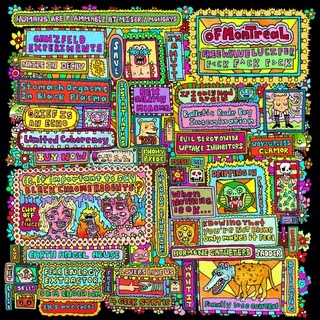The band’s latest is geeky, restless, and stuffed with enough Barnesian minutiae to satisfy even the most dedicated fan.
About twice a decade, Kevin Barnes dials back their tendency to indulge every experimental whim and emerges from the studio with an Of Montreal record that delivers a handful of solid, anthemic pop choruses. Inevitably, Barnes then wheels the band’s shiny new sound into the garage for a few years and disassembles its inner workings until it looks like a musical mecha: probably undriveable, but a transfixing, chimeric work of art nonetheless. Once the finished product is suitably unrecognizable, the cycle begins anew. Freewave Lucifer F<ck F^ck F>ck, Of Montreal’s 18th full-length album, is another snapshot of the band in a state of manic deconstruction, retooling 2020’s hooky, ’80s-inspired UR FUN into a labyrinthine dance-rock collage.
After 2005’s The Sunlandic Twins ditched Barnes’ original garage rock sound for synthpop catchy enough to land an infamous Outback Steakhouse placement, 2008’s Skeletal Lamping shattered this new aesthetic into lopsided fragments and arranged them into a stained glass window of psychosexual angst. In 2012, Paralytic Stalks used the baroque funk of 2010’s False Priest as the catalyst for some of Barnes’ earliest flirtations with the mid-century classical avant-garde. Freewave Lucifer, intricately fashioned and governed by stream of consciousness, is a direct reaction to the uncharacteristically straightforward UR FUN, which surely would have bolstered the band’s live presence had it not dropped three days before the United States’ first confirmed COVID case.
While retaining its predecessor’s heavy reliance on electronic instrumentation, the new album doesn’t seem to have been written with future performance—or any explicit purpose—in mind. The record was purportedly organized by the tenets of its namesake, Barnes’ own “freewave” philosophy, which encourages surrender to one’s own “wild and intractable” impulses. In practice, it’s similar to William S. Burroughs’ “cut-up” technique. Non-sequitur phrases plucked from conversations, excerpts from the dust jackets of used books, and copious references to Barnes’ favorite artists are tossed like word salad.
Barnes’ polysyllabic writing style has both helped and hindered their storytelling in the past, but here, lines like “apotheosis of apotropaic neuromancers” exist outside of any narrative. They’re as much a part of the album’s ambience as a synth pad, employed more for the sound of their assonance or sci-fi inspired imagery than explicit meaning, though they do tend to dredge up old scraps of Barnes’ personal mythos along the way. On “Ofrenda-Flanger-Ego-à Gogo,” a cute barbershop melody that Barnes often used on early records like The Gay Parade and Horse & Elephant Eatery surfaces as they quote The Wizard of Oz atop dissonant fingerpicking and shimmering bells. “Blab Sabbath Lathe of Maiden,” easily the most danceable cut, calls back to the band’s indie-disco fusion of the mid-aughts, its new wave sequencing interrupted by ABBA-esque detours.
Even the suite-like song structures Barnes has relied on since the mid-2000s feel more insular and nebulous. The loosely related snippets that make up opener “Marijuana’s a Working Woman” recall the Skeletal Lamping standout “An Eluardian Instance,” but there’s no extroverted flourish of brass or soaring guitar riff vying for your ear. Whether Barnes is pounding out a lurching psych rock groove, weaving an orchestral break that could soundtrack a cartoon nightmare, or taking a stab at cocktail jazz, each section of the track retains enough restraint to mirror the hazy quality of their accompanying lyrics.
Occasionally, Barnes gets lost in this formlessness. “Modern Art Bewilders” delves into interesting textures, gradually morphing a kitschy symphonic intro into a mid-tempo industrial stagger, but there’s no daring impulse decision that allows them to briefly transcend the chaos. The following track, “Nightsift,” navigates its free-ness much more effectively, introducing a rising lead that periodically reappears throughout. It’s not quite a chorus—more like a signal flare to guide you through the knottier passages.
This deep in their career, Of Montreal aren’t seeking to draw new fans into the fold as much as they are in expanding their own creative multiverse. If Freewave Lucifer were a blockbuster flick, it’d be a reality-bending fan service fest in the vein of Spider-Man: Into the Spider-Verse. Your enjoyment may depend on your investment in the story arcs and alternate identities Barnes has explored over the past 17 albums, but true heads will have as much fun poring over this record as you might have had studying Star Wars visual encyclopedias as a kid. It’s unabashedly geeky, restless, and stuffed with enough Barnesian minutiae to satisfy even the most dedicated fan. The uninitiated, however, may need to study up on their lore before diving in.



0 comments:
Post a Comment